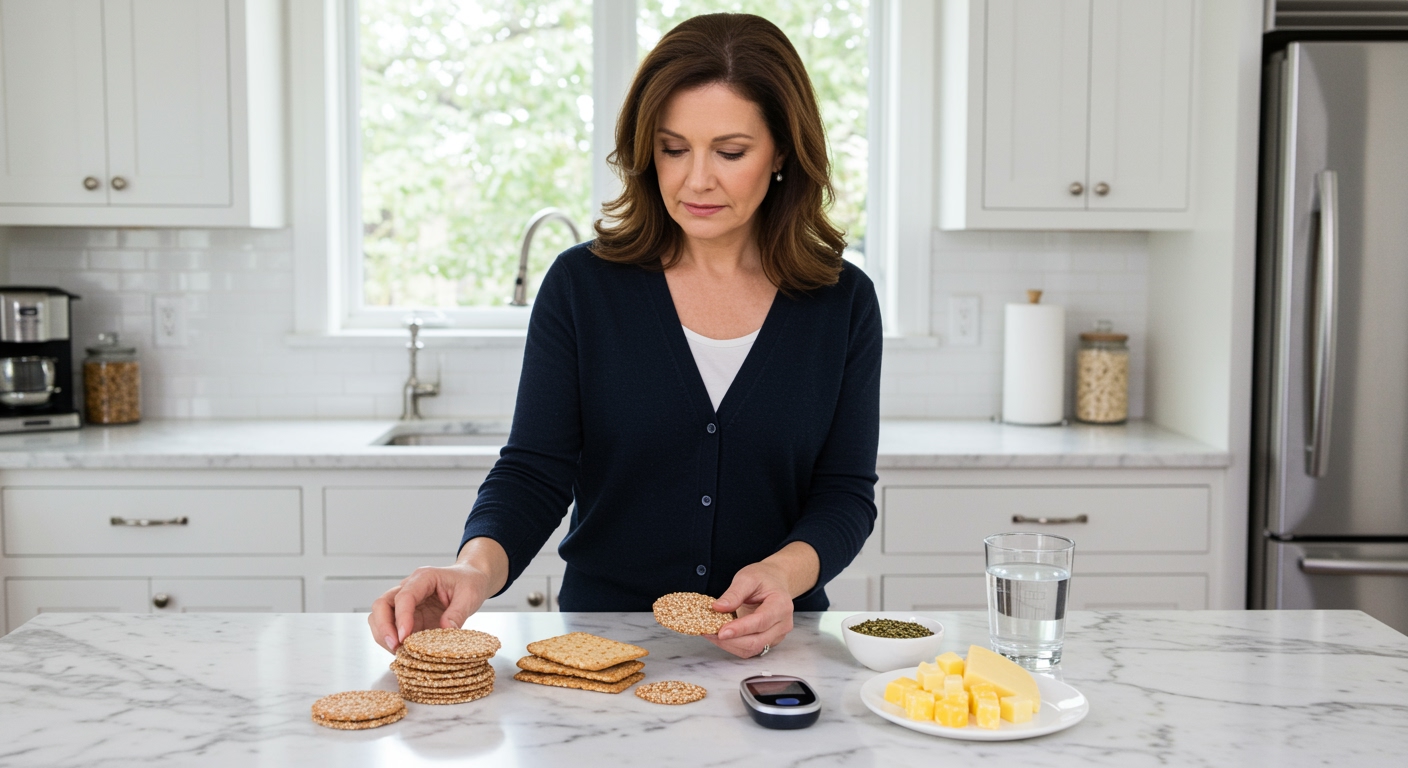✪ Key Takeaway: Most crackers spike blood sugar quickly, but whole grain options with fiber can be safer choices when eaten in small portions.
Introduction
You reach for that innocent-looking sleeve of crackers during your afternoon snack break.
But if you have diabetes, this simple choice might be sabotaging your blood sugar control in ways you never imagined.
Hi, I’m Abdur, your nutrition coach, and today I’m going to reveal the hidden truth about crackers and diabetes that most people overlook.
Do Crackers Raise Blood Sugar Levels?
Most crackers act like sugar bombs in your bloodstream.
Regular crackers have a glycemic index between 70-80, which means they raise blood sugar almost as fast as pure glucose.
When you eat crackers, your digestive system breaks down the refined flour into simple sugars within minutes.
These sugars flood your bloodstream, causing a sharp spike that can be dangerous for people with diabetes.
The problem gets worse because crackers contain very little fiber or protein to slow down this sugar absorption.
Your pancreas responds by releasing insulin rapidly, but this often leads to a blood sugar crash later, making you crave more carbohydrates.
✪ Fact: A single serving of saltine crackers can raise blood sugar as much as eating two slices of white bread.
Which Types Of Crackers Are Safer For Diabetes?
Not all crackers are created equal when it comes to blood sugar impact.
Whole grain crackers with at least 3 grams of fiber per serving can slow down sugar absorption significantly.
Look for crackers made with almond flour, flaxseed, or other low-carb ingredients that provide protein and healthy fats.
Seed-based crackers often contain omega-3 fatty acids and minerals that actually support better insulin sensitivity.
The key is finding options with less than 15 grams of total carbohydrates per serving and minimal added sugars.
Crackers with added protein powder or cheese can also help stabilize blood sugar by providing sustained energy without the spike.
✪ Pro Tip: Always check the ingredient list and choose crackers where whole grains appear as the first ingredient.
How Many Crackers Can You Safely Eat?
Portion control becomes critical when you have diabetes and want to include crackers in your diet.
Most diabetes educators recommend limiting crackers to about 15 grams of carbohydrates per snack, which equals roughly 6-8 small crackers.
This amount typically raises blood sugar by 30-50 points in most people with diabetes, depending on their individual insulin response.
Eating crackers with protein sources like cheese, nuts, or hummus can help reduce the total glycemic impact of your snack.
The timing of when you eat crackers also matters significantly for blood sugar management.
Consuming crackers right before or after physical activity can help your muscles use the glucose more efficiently, preventing dangerous spikes.
✪ Note: Your individual carb tolerance may vary, so monitor your blood sugar 2 hours after eating crackers to find your safe limit.
What Should You Pair With Crackers?
The secret to enjoying crackers safely lies in what you eat alongside them.
Pairing crackers with healthy fats like avocado or olive tapenade slows down carbohydrate absorption in your digestive tract.
Protein-rich toppings such as turkey, tuna, or Greek yogurt help stabilize blood sugar by triggering a more gradual insulin release.
Fiber-rich vegetables like cucumber slices or bell pepper strips add volume without adding significant carbohydrates to your snack.
Nuts and seeds provide magnesium and chromium, minerals that help your body process glucose more effectively.
Even a small amount of vinegar-based foods like pickles can help improve your body’s glucose tolerance when eaten with crackers.
✪ Pro Tip: Create balanced snacks by combining crackers with protein, healthy fats, and fiber to minimize blood sugar spikes.
The Bottom Line
Crackers can fit into a diabetes-friendly diet when you choose the right types and control your portions carefully.
Smart food choices are not about perfection, but about making better decisions most of the time, and understanding how different foods affect your unique body.
I would love to hear about your experiences with crackers and blood sugar management, so please share your questions or thoughts in the comments below.
References
At NutritionCrown, we use quality and credible sources to ensure our content is accurate and trustworthy. Below are the sources referenced in creating this article:
- January AI: Glycemic Index of Crackers
- Glycemic Index Net: Crackers Glycemic Index
- Food Box HQ: Best Crackers for Diabetics
- University of Illinois Extension: Snacking and Diabetes





